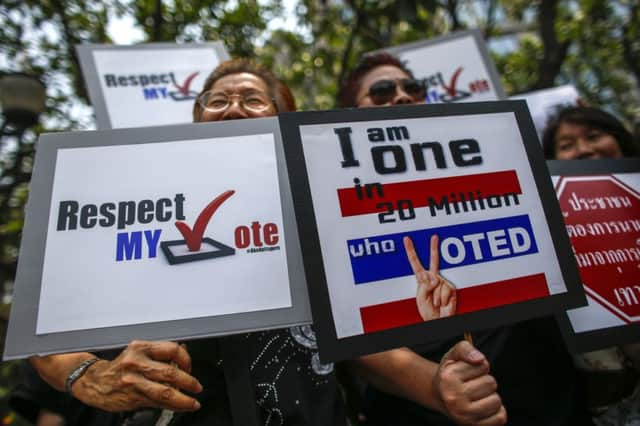Judges annul Thailand’s election result


Weakened by five months of unrest, prime minister Yingluck Shinawatra is expected to defend herself before an anti-corruption commission by 31 March, and a decision to seek her impeachment could come soon after that, with the senate expected to take up the matter quickly.
As the crisis deepens, there is a growing risk that the “red shirt” supporters of Yingluck and her brother Thaksin Shinawatra – a prime minister who was removed from office – could confront their opponents in the streets, plunging Thailand into a fresh round of political violence.
Advertisement
Hide AdAdvertisement
Hide AdTwenty-three people have been killed in the unrest since November, and the economy has suffered and tourists have stayed away as protesters shut government offices and at times blocked major thoroughfares in Bangkok to try to force Ms Shinawatra out.
Confident that her Puea Thai Party would win, she had called an election on 2 February in a bid to defuse anti-government protests, and since then she has headed a caretaker government with limited powers.
Judges ruled in a six-to-three vote yesterday that the election was unconstitutional because voting failed to take place on the same day around the country.
Anti-government protesters had stopped voting in about a fifth of constituencies, and in 28 of them voting was not possible at all because candidates were unable to register.
The agitation was the latest chapter in an eight-year crisis that pits Bangkok’s middle class and royalist establishment against supporters of Ms Shinawatra and her brother, who was toppled by the army in 2006 and lives in exile to avoid a jail term for graft.
Encouraged by the dwindling number of protesters in recent weeks and relative calm on the streets, the government lifted a state of emergency on Wednesday. However, the focus has shifted to the courts, in particular to the prospect of Ms Shinawatra being impeached over a rice scheme that has gone badly wrong, with hundreds of thousands of farmers not getting paid for grain sold to the state since October.
More upheaval would ruin chances of the recovery in private spending and therefore in the economy in the second half of the year that the central bank forecast last week. Bank of Thailand assistant governor Paiboon Kittisrikangwan said: “Tourism should improve after the lifting of the state of emergency and that will also help support growth in the second half.”
However, the outlook is highly uncertain.
Ominously, Mr Shinawatra’s “red shirt” supporters are beginning to sound more militant under new hardline leaders, raising the prospect of more violence if his sister is forced out by the courts, the anti-corruption commission or by other means.
The commission could shortly recommend her impeachment.
Advertisement
Hide AdAdvertisement
Hide AdShe could then be removed from office by the upper house senate, which is likely to have an anti-Thaksin majority after an election for half its members on 30 March.
Some analysts say it will fall to the senate to then appoint a “neutral” prime minister, probably the type of establishment figure the protesters have been demanding all along.
It is unclear when a new election will take place. Supachai Somcharoen, chairman of the election commission, told reporters it would take at least three months to organise a new election, and would depend on the political situation.